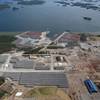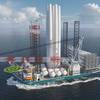The Harbor Performance Enhancement Center (HPEC), a unique $130 million-dollar public-private partnership dedicated to facilitating sustainable freight movement and supply chain efficiencies throughout the United States, has completed a strategic transaction with Macquarie Principal Finance, to provide capital for the development of the 5.5 million square foot container staging hub located at Terminal Island in the Port of Los Angeles (POLA).
As detailed in a brief video, the public-private project will transform 110 acres that is currently fallow and bring the latest technology and a unique set of operating capabilities to bear on the challenges that currently constrain freight flow through the busiest port in the Western Hemisphere.
When complete, the project will take 3,500 truckloads per day from nearby container terminals to the HPEC staging area. HPEC will improve flow, increase velocity, reduce emissions, add jobs, and enhance the efficiency of imported containers passing through the 14 marine terminals at the San Pedro Bay complex, a complex that supports 42% of all U.S. Imports.
Jonathan Rosenthal, Founder/CEO of HPEC said, “The HPEC development presents a truly unique opportunity to make the San Pedro Harbor the most competitive gateway for transpacific freight while reducing community impacts of the nation’s most important artery. In Macquarie we have found an industry-leading partner that shares our commercial vision and our public/private mission - to be the first privately-owned firm that enhances the performance objectives of surrounding intermodal freight facilities throughout the United States and eventually around the world. HPEC will increase productivity at the Port by 10% or more.
"HPEC’s innovative approach will relieve congestion throughout the region, increase cargo velocity through the Port, lower handling costs, reduce emissions, and dramatically improve freight flow efficiencies in the San Pedro Bay complex,” said Alex Cherin, Executive Director of the California Trucking Association's Intermodal Conference. "With HPEC coming online, the trucking community and its customers will have one start-stop location to pick up and drop off containers, distributing to regional hubs around the clock. This is one of the most important projects in the nation and will be a real game changer," said Cherin.
HPEC has garnered unprecedented support from the San Pedro Bay Sustainable Supply Chain Advisory Committee, a group made up of shippers, the California Air Resources Board, the Southern California Air Quality Management District, ocean carriers, terminal operators, trucking companies, labor, and environmental groups.
While members of the group often share different perspectives, they all agree that HPEC will be a critical piece of the freight flow infrastructure in the San Pedro Harbor and a valuable asset as the goods movement industry continues to undergo a massive transformation.
Given the central location of the Project site to the Harbor Department’s largest container terminals, and the projected volume of cargo moving through the San Pedro Bay ports, the project will support critical truck-based cargo movements through the gateway and thus may greatly augment core cargo handling functions.
By utilizing the highly successful hub and spoke distribution model to achieve improved efficiency, HPEC will use a system perfected by companies such as Federal Express, UPS, and Yellow Freight. The innovative distribution model reduces transportation costs, improves cycle times, and reduces inventory while improving the distribution processes.
Andrew Honan, Senior Managing Director of Macquarie Principal Finance, said: “We are pleased to be joining forces with the HPEC team to develop a key part of one of the nation’s core pieces of infrastructure, the principal gateway from Asia and a critical component of the freight ecosystem. When completed in three years, HPEC will reduce waiting times and congestion by allowing trucks access to a staging area where pick-ups and deliveries will be streamlined.”
HPEC will also include an educational component at an on-site facility that will be used as a laboratory to facilitate learning, collaboration and the pursuit of new innovative ideas among the world’s leading stakeholders in the goods movement industry, academia, and other related organizations. The facility will showcase and foster economic and environmental innovation within the supply chain.










